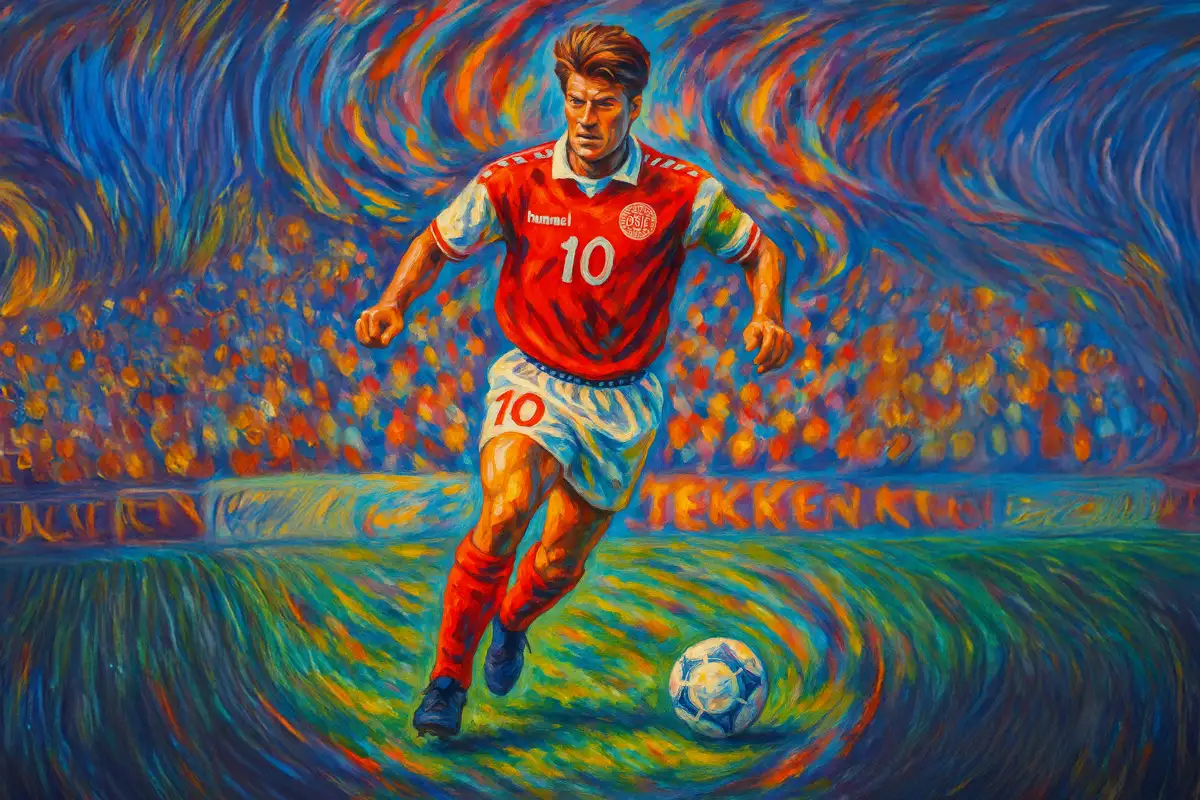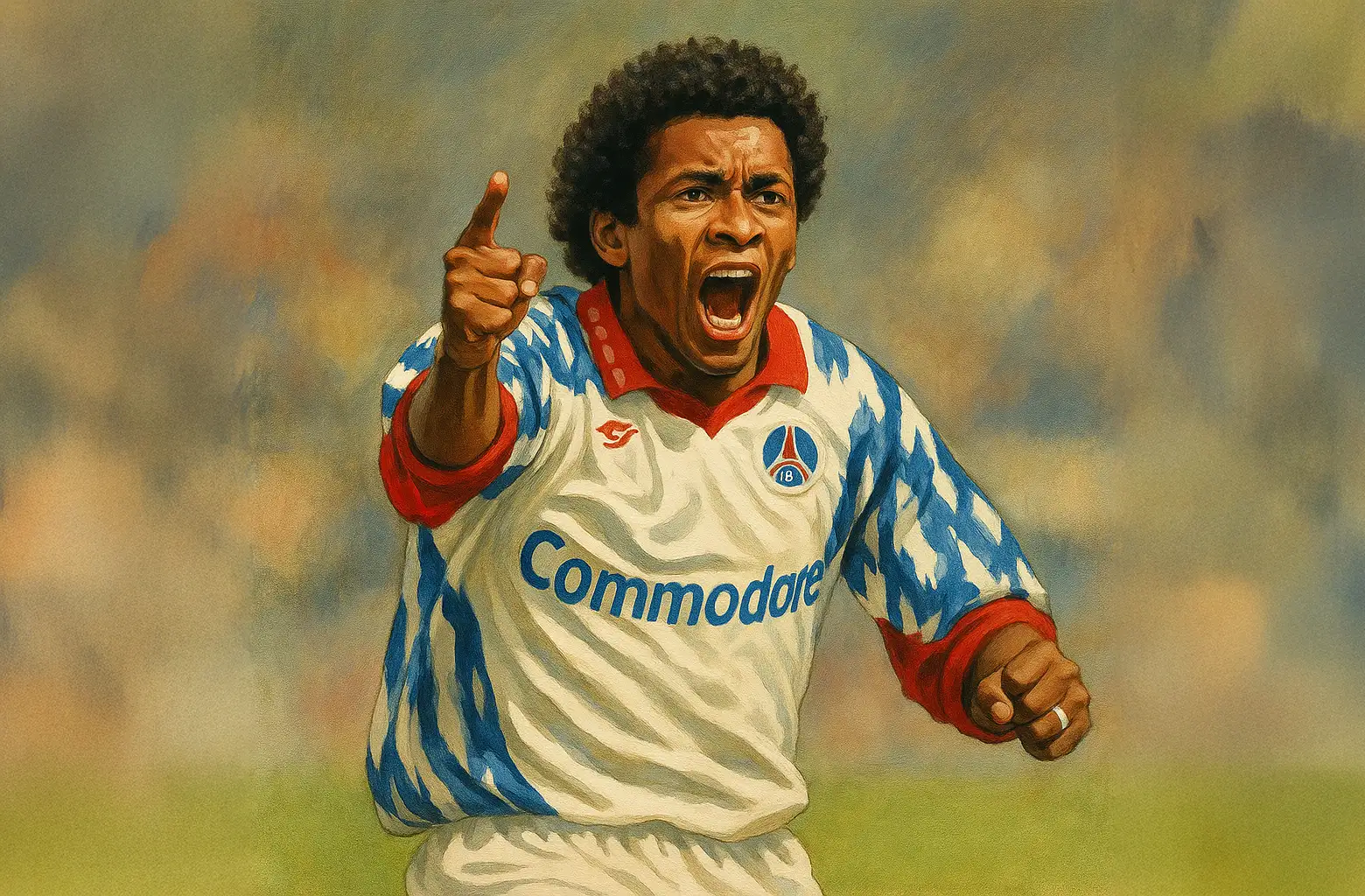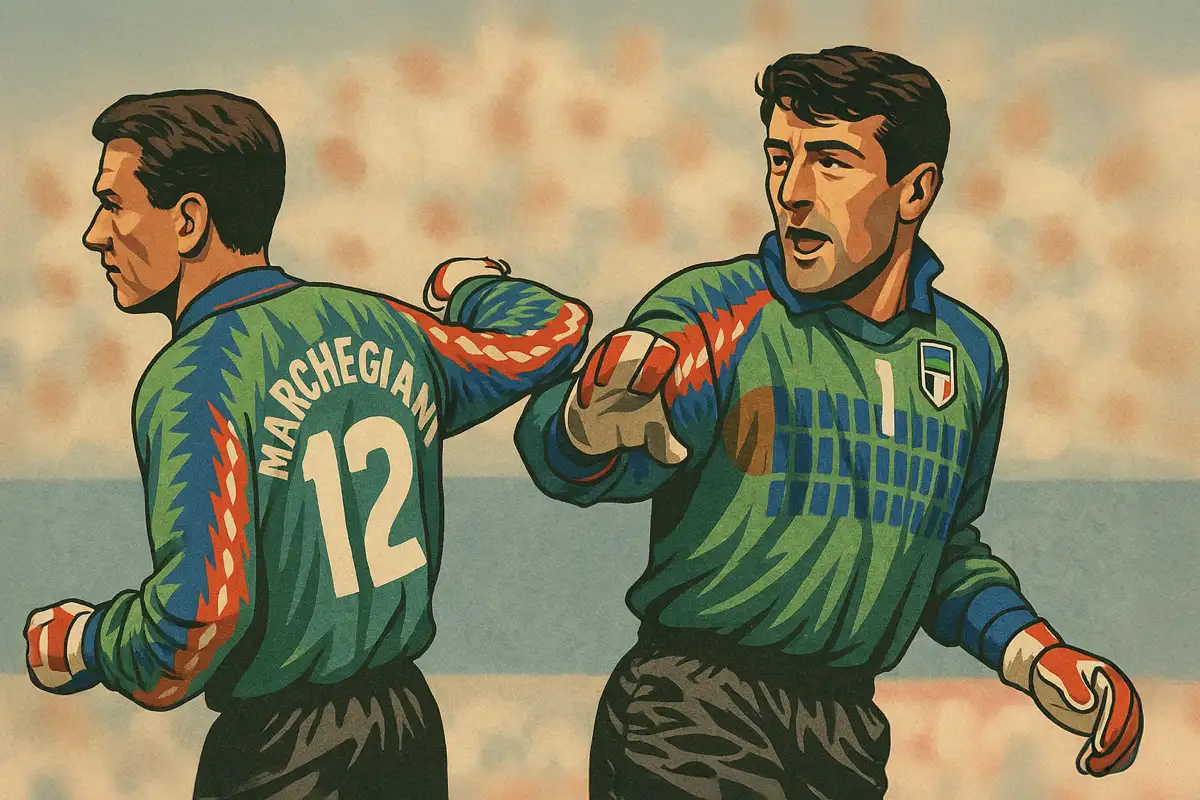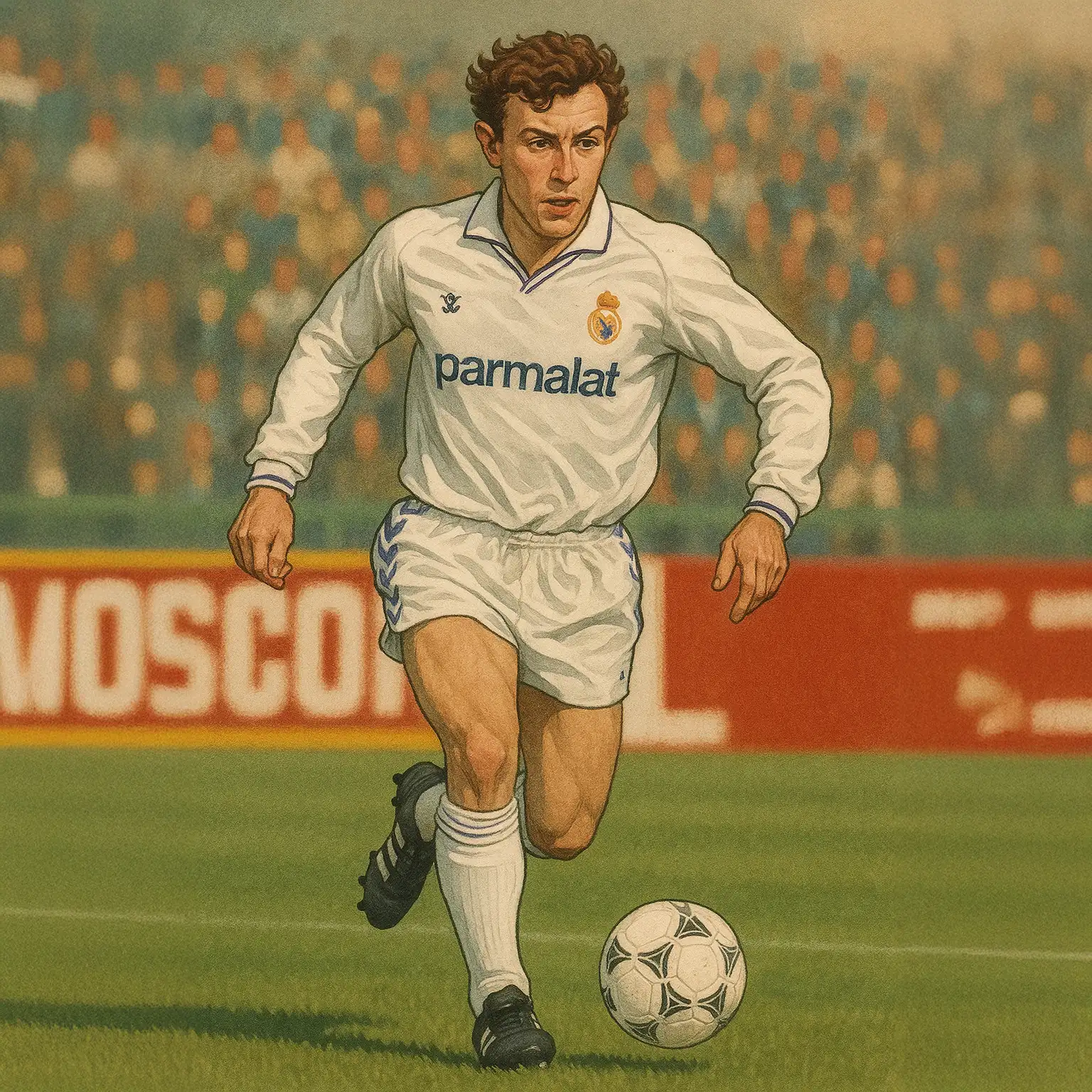
Some players dominate with power. Others with leadership. And then there are those rare few who enchant simply by touching the ball. Michael Laudrup was one of them — a quiet genius who made football beautiful.
He graced Europe’s biggest clubs, winning titles in Italy, Spain and the Netherlands. At Barcelona, he was the maestro of the Dream Team. At Real Madrid, he became the symbol of elegant revenge. For Denmark, he was everything… except a champion.
Because in the summer of 1992, when his country shocked the world and won the European Championship, Michael Laudrup wasn’t there. And perhaps he was never more present than in that absence.
This is the story of Michael Laudrup. The man who was there for every stage — except the biggest one. The maestro who missed the miracle.
The Silk of Frederiksberg
Michael Laudrup was born on 15 June 1964 in Frederiksberg, a leafy enclave near Copenhagen. He was born into Denmark’s other royal family—the Laudrups. His father Finn had been a Danish international in the 1970s, and both Michael and his younger brother Brian inherited the gift. Football wasn’t just the family business—it was the family language.
Michael began at Vanløse before following his father to Brøndby and then to KB (Kjøbenhavns Boldklub), Denmark’s top club at the time. It was there that he truly announced himself. In 1982, still just 18, he scored 15 league goals and was voted Danish Player of the Year. On his 18th birthday, he made his senior debut for the Danish national team, becoming the second-youngest debutant ever.
Offers came from all over Europe, and he famously turned down Liverpool, who tried to amend the contract at the last moment. Juventus swooped in with a record $1 million transfer fee for a Danish player. But there was a catch. With Michel Platini and Zbigniew Boniek already occupying the two foreign player slots allowed under Serie A rules, Juventus loaned Laudrup to newly-promoted Lazio. He hadn’t been informed.
Lessons in Lazio and Turin
At Lazio, Laudrup made an impression despite the team battling relegation. He scored two goals on his Serie A debut in a 2–4 defeat to Hellas Verona. In his second season, Lazio were relegated, but Laudrup’s talent still shone through. And his international star rose as he featured in Denmark’s exciting run to the semi-finals of Euro 1984, playing all four matches as Denmark reached the semi-finals.
In 1985, with Boniek moving to Roma, Laudrup returned to Juventus to partner Michel Platini, alongside icons like Scirea and Tacconi. That season, he helped Juve win the Serie A title and scored the equaliser in the Intercontinental Cup final, which Juventus won.
But with Platini’s retirement in 1987, Laudrup was expected to fill the void. Paired with Ian Rush, he played all 30 matches of the 1987–88 campaign but failed to score. Platini later said: “Michael had everything to be the best, except one thing: he was too unselfish.”
Tired of the tactical chains of Italy and seeking new freedom, Laudrup left Juventus in 1989. Seeking a new beginning, Johan Cruyff offered him a dream.
The Architect of the Dream Team
Laudrup’s arrival in Barcelona coincided with the dawn of the legendary “Dream Team.” Alongside Ronald Koeman, Hristo Stoichkov, and later Romário, and under the watchful eye of Cruyff, Laudrup brought poetry to the pitch. Rising stars like Pep Guardiola, Txiki Begiristain and José Mari Bakero completed a side that played football with jazz-like rhythm.
From 1991 to 1994, Barcelona won four consecutive La Liga titles and, in 1992, lifted their first-ever European Cup, defeating Sampdoria at Wembley. In total, Laudrup claimed nine trophies with Barça. Twice, he was voted Spain’s best player.
Charging strong for the league title, on 8 January 1994, Barcelona destroyed their rivals Real Madrid 5–0. Laudrup conducted the symphony, and Romário scored a hat-trick.
But the harmony was fragile. When they signed Romário earlier that season, Barcelona added a fourth foreign star to the team and forced a rotation of the three allowed per match. Laudrup, increasingly the odd man out, was not even on the bench for the 1994 European Cup Final, a 0–4 loss to AC Milan. That was the final straw. Fabio Capello later said: “Laudrup was the one I feared. Cruyff left him out. That was his mistake.”
That summer, Guardiola cried upon hearing Laudrup might leave. “I learnt everything from him,” he told a Danish journalist. It wasn’t enough. Laudrup signed with Real Madrid.
“
Laudrup was the one I feared. Cruyff left him out of the final. That was his mistake.
Fabio Capello, after the 1994 European Cup Final Tweet
Farewell to Camp Nou, Hello Bernabéu
He left that summer to join arch-rivals Real Madrid, led by Jorge Valdado. Madrid won La Liga that season, giving Laudrup five consecutive Spanish titles. He was one of the rare players genuinely loved on both sides of the Clásico barricades.
When asked about the reasons for switching sides, Laudrup stated: “People say I wanted revenge. But for what? I had five fantastic years. I left because Madrid were hungry. They wanted to win.”
On 7 January 1995, 364 days after that famous 5-0 Barcelona win, Madrid returned the favour—a 5–0 thrashing of Barcelona, this time with Iván Zamorano netting a hat-trick and Laudrup again pulling the strings. He remains the only player to win 5–0 El Clásicos for both clubs.
Though his second season in Madrid lacked the same spark, his legacy was secure. In 1999, he was voted the Best Foreign Player in La Liga of the past 25 years.
The One Who Wasn’t There
Despite his brilliance, Laudrup’s most famous international moment is one of absence.
After starring at Euro 1984 and the 1986 World Cup—where he scored a stunning solo goal in a 6–1 win over Uruguay and helped Denmark top a group that included West Germany—Laudrup was already a household name. But Denmark crashed out in the Round of 16, thrashed 5–1 by Spain as Emilio Butragueño scored four.
At Euro 1988, Laudrup scored again, but Denmark lost all three group matches. Frustration grew.
Following disagreements with coach Richard Møller Nielsen, Laudrup, Brian Laudrup, and Jan Mølby walked away from the national team in 1990. When Denmark failed to qualify for Euro 1992, few were surprised. But when war in Yugoslavia led to Denmark’s unexpected invitation to the tournament, everything changed—except Laudrup’s stance.
He stayed on holiday. He thought Denmark had no chance. And then Denmark shocked Europe.
They beat France. Then the Netherlands on penalties. Then Germany—reigning world champions—2–0 in the final. It was the greatest triumph in Danish football history.
Was it his absence that made them win? Did the lack of a dominant star force unity? Did they thrive without the pressure of feeding a maestro? It’s a question without an answer—and yet, one that defines his legacy as much as any trophy.
Return and Redemption
Laudrup returned to the national team in 1993. He led Denmark to victory at the 1995 Confederations Cup, captaining the side to a 2–0 win over Argentina in the final. He would go on to feature at Euro 1996, scoring in qualification but seeing Denmark bow out in the group stage.
In 1998, Laudrup captained Denmark at the World Cup in France. In their opening match, he earned his 100th cap. Together with Brian, he led Denmark to the quarter-finals, where they lost 3–2 to eventual finalists Brazil in one of the tournament’s best matches. Both Laudrups were named in the FIFA All-Star Team. And both retired from international football after that tournament.
Michael finished with 104 caps, 37 goals, and 28 matches as captain. He had been present in all but one of Denmark’s major tournaments across two decades—and the one he missed was the one they won.
The Curtain Call
After Madrid, Laudrup ventured to Japan, joining Vissel Kobe in 1996, where he played two seasons.
In 1997, he returned to Europe for a final season at Ajax. There, he played alongside the De Boer brothers, Edwin van der Sar, and Jari Litmanen. Ajax won the Eredivisie and the Dutch Cup. It was a fitting final flourish.
Laudrup retired in 1998. He had played for some of Europe’s most historic clubs, won titles in three countries, and captivated fans from Copenhagen to Kobe.
Legacy in Absence
Laudrup was officially named the greatest Danish footballer of all time by the Danish Football Union in 2006. His legacy transcends numbers. Platini called him the most intelligent player he had seen. Guardiola cried when he left. Romário called him the best he ever played with. Zidane revered him.
He never won the Ballon d’Or. He never won the World Cup. But he did something perhaps more important: he made football more beautiful.
And in that strange way football often works, Michael Laudrup’s greatness is forever tied to the one tournament he missed. Euro ’92.
Because sometimes, the most powerful presence is absence.
And sometimes, the best player doesn’t lift the trophy—but elevates the game itself.

Valdo – provisory title
He dribbled like a dancer, played with a smile, and made chaos look beautiful. A rebel with the ball, and a genius no system could ever hold down.

Italy’s 90’s Goalkeepers – provisory title
He dribbled like a dancer, played with a smile, and made chaos look beautiful. A rebel with the ball, and a genius no system could ever hold down.

Emilio Butragueño – provisory title
He dribbled like a dancer, played with a smile, and made chaos look beautiful. A rebel with the ball, and a genius no system could ever hold down.

